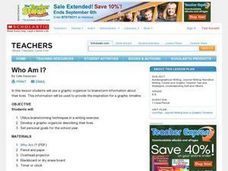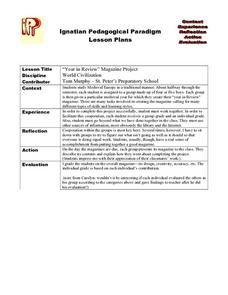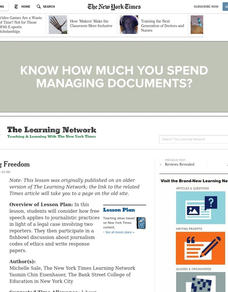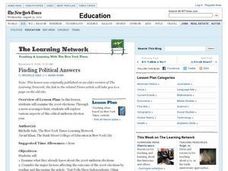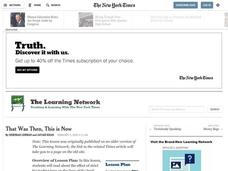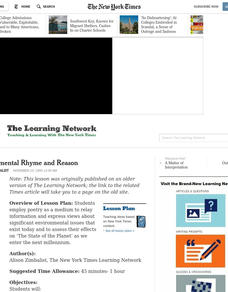Curated OER
Can you think of pictures that will tell a story about rice?
First graders use pictures and letters to create a rebus. In this writing sentences lessons, 1st graders analyze sample rebuses as a class and read a rice rebus independently. Students make three rebus sentences. Students play a rice game.
Curated OER
Guided Reading Organizer for Chain Reaction
The class uses Chain Reaction, a magazine, to build a better understanding of Latin and Greek roots found in scientific vocabulary. They use two attached worksheets to help them read a scientific article, using visual clues and their...
Curated OER
Animals
Students become familiar with the need for categorizing scientific information, in this case, animals. They categorize the 5 groups of animals in a collage and answer questions about each.
Curated OER
Author's Purpose
A simple activity for young readers, this introduces the idea of author purpose. Learners analyze various types of texts (newspaper articles, magazines, books, advertisements, etc.) and determine if the author's purpose for writing was...
Curated OER
The Story of the Solar System
There is more to the solar system than the typical study of the sun and planets. Launch a study of asteroids, meteoroids, and comets by watching the video The Story of the Solar System, available for purchase through this resource on the...
Curated OER
Understanding Stage Design: Using Visual Elements to Provide Information to an Audience
Students study about theatrical design by developing environments for improvised and scripted scenes. They develop focused ideas for an environment using visual elements.
Curated OER
Who Am I? - Brainstorming
Students brainstorm lists of places, events and relationships that define them. They search for clip art and pictures in magazines to illustrate the items on their list and create a graphic timeline of their lives.
Curated OER
Art Careers: Interior Decorator
Students redesign specific areas of their school using interior design techniques, magazine ideas, and cooperative learning groups in this middle and high school level instructional activity. Emphasis is on examining the career...
Curated OER
"Year in Review" Magazine Project
Students, in groups, study Medieval Europe in a traditional manner, and then create a "Year in Review" Magazine Project.
Curated OER
Changing Attitudes about Nature Through Bird Identification
Pupils, in groups, learn and review bird flash cards, after hearing stories about the birds from the teacher. They participate in labs such as owl pellets, feathers, etc.
Curated OER
Resource Based Learning Unit Using Mad Cow Disease
Students research the topic of mad cow disease. They use an internal research network to search for newspaper and magazine articles about the disease. They are to evaluate the information they find and determine if it is creditable.
Curated OER
Reading and Thinking About Evolution
Students explore evolution. They read magazine articles related to evolution. Students describe arguments for/against evolution that the author used. Students discuss their findings.
Curated OER
Discover Magazine: The Solar System
Young scholars research ideas for NASA's space exploration. For this Space Science lesson plan, students will try to find a way to bring NASA back into the spot light. Young scholars will presented their ideas to the class for review.
Curated OER
Writing About Winter
Students investigate the concept of winter as a season and they write an essay as a reflection upon the acquiring of new information. The class should have a list of vocabulary or a word wall available for observation to aid in the...
Curated OER
Respectful Interview
Learners interview elderly people in a senior citizen community center. In this character counts lesson, students interview the elderly about how society can be more respectful. They videotape and watch the interviews together.
Curated OER
Beauty in the Eye of the Scientist
Young scholars research science's 10 most beautiful experiments and the historical periods in which these experiments were conducted. Then, students create magazine covers for issues of a fictional magazine.
Curated OER
Race to the Presses
Students explore how the news media relays information about race in the United States by creating collages from newspapers and magazines and by sharing their reflections about the responsibilities of the news media in covering...
Curated OER
Press-ing Freedom
Students consider how free speech applies to journalistic practices in light of a legal case involving two reporters. They participate in a fishbowl discussion about journalism codes of ethics and write response papers.
Curated OER
Stories That Go with the Territory
Students investigate various expeditions throughout history to new and/or uncharted territories. They work in groups to develop and 'produce' television news magazine segments about some of these historic expeditions.
Curated OER
Soulfully Remembered
Students study about the Mexican holiday Day of the Dead to explore another culture's attitude towards death. They create collages reflecting the interests of and memories about someone who has passed away.
Curated OER
Finding Political Answers
Learners discuss the 2006 midterm elections. They read an article about exit polls. They create a scavenger hunt using articles of the New York Times. They write a paper about the importance of midterm elections.
Curated OER
That Was Then, This is Now
Students read about the effect of strict fur trading laws on the lives of the Inuit people in Canada, then use print and digital resources to compare past and present-day ways of life of several indigenous peoples around the world.
Curated OER
A Civil Action
Learners explore the roles of law enforcement officials, the news media, and civilians in crime prevention and criminal apprehension. They envision ways to build and strengthen community partnerships to address concerns about crime.
Curated OER
Environmental Rhyme and Reason
Students employ poetry as a medium to relay information and express views about significant environmental issues that exist today and to assess their effects on The State of the Planet as we enter the next millennium.








